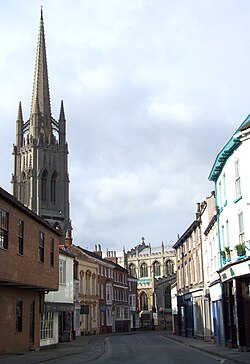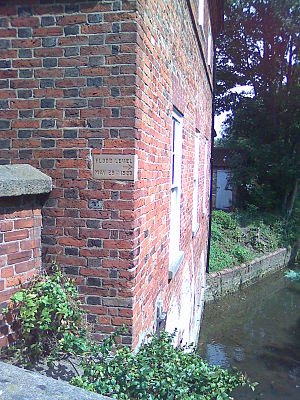Louth, Lincolnshire
| Louth | |
| Lincolnshire | |
|---|---|
 Upgate | |
| Location | |
| Grid reference: | TF326874 |
| Location: | 53°22’1"N, 0°0’22"W |
| Data | |
| Population: | 15,930 ('2001) |
| Post town: | Louth |
| Postcode: | LN11 |
| Dialling code: | 01507 |
| Local Government | |
| Council: | East Lindsey |
| Parliamentary constituency: |
Louth and Horncastle |
Louth is a market town of Lindsey, Lincolnshire. It is known as "the capital of the Lincolnshire Wolds". The town grew up where the ancient trackway Barton Street crosses the River Lud
The Greenwich Meridian crosses Eastgate and this point is marked with a plaque on the north side of the street, just east of the junction with Northgate.
Contents
The town
Louth enjoys a fine selection of independent retailers, in particular specialist grocers.[1] Just off the Market Place is the department store Eve and Ranshaw, whose history can be traced back to 1781 [1] whilst Eastgate is noted for its range of local shops including award winning butchers and an independent chain of 'Dragonfly' shops. Several Major retailers have failed to make an impact in Louth.
Market times
Wednesdays, Fridays and Saturdays are all market days, with a farmers' market on the fourth Wednesday of each month. A cattle market is held each Thursday at the Louth Livestock Centre on Newmarket.
History
Louth was the site of important monastery from Anglo-Saxon times, founded in the late 7th century. The monastery was destroyed by the invading Danes in the 9th century.
By the 10th or early 11th century, Louth had grown into a small market town. In 1139 a new, Cistercian Abbey was built at Louth Park. The parish church, St James, mainly dates from the 15th century. In the earlier 16th century, from 1501-1515, its distinctive octagonal tower was built.
In 1536 King Henry VIII dissolved the monasteries. The townspeople reacted to the closure of Louth Abbey and the removal of its treasures with the Lincolnshire Rising, a forerunner of Pilgrimage of Grace. A march began on 1 October 1536 at St James Church after evensong and gained momentum in nearby towns, the marchers raising a series of political and religious demands. It ended at Lincoln when threatened with military action, and at Tyburn for those who remained defiant.
In the early modern period, Louth became wealthy through the wool trade.
A canal was built to Louth in the 1770s, which became a major thoroughfare for the town, adding to the town's prosperity. The canal was over eleven miles in length, extending from Louth Riverhead to Tetney. Eight locks were incorporated to overcome the forty six feet differential in levels involved. Trade through the canal was brisk and there were regular sailings to London and Hull and other local ports.
A flood occurred in the town on 29 May 1920, causing 23 deaths. Several stone plaques in the town show the high water level reached. Other, less devastating floods occurred on 25 June and 20 July in 2007.
Sights in and about the town
Much of the town centre is lined with brick buildings from the 17th and 18th centuries and the town's skyline is dominated by St James Church, whose 295 foot spire makes it reputedly the tallest parish church in the United Kingdom. The church spire was completed in 1515.
Louth museum has a Panorama Gallery which features two back-lit replicas of William Brown’s Panorama of Louth viewed from the top of St James’s spire in 1844. The two original paintings that together form the panorama hang side-by-side in the Council Chamber of the Town Hall on Little Eastgate. The panorama gives a unique and vivid representation of the streets, businesses, homes and people of the town and the landscape as far as the North Sea to the east and northwards to the Humber estuary and beyond.[2]
Places of interest
Hubbard's Hills is one of the town's main attractions. It was opened to the public in 1907. The park is dedicated to the memory of Annie Pahud, the central character of a beautiful but tragic real-life love story. The park is situated in a glacial overspill channel that forged the course followed by the River Lud which meanders along the deep, flat valley bottom between steep, wooded slopes on either side.
Cadwell Park motor racing circuit is around four miles south of the town, between the villages of Scamblesby and Tathwell.
The town's Playhouse Cinema is on 'Cannon Street, and is home to Louth Film Club, which won the British Federation of Film Societies' Film Society of the Year Award in 2008.[3] The Riverhead Theatre is on Victoria Road, to the east of the town.
References
- ↑ Prince, Rose (2007-06-30). "Shop local". The Daily Telegraph (London). http://www.telegraph.co.uk/foodanddrink/healthyeating/3338353/Shop-local.html. Retrieved 2010-05-11.
- ↑ "Louth Museum". http://www.louthmuseum.co.uk/. Retrieved 2009-09-23.
- ↑ "Film Society of the Year Awards 2008". http://www.bffs.org.uk/awards/abouttheawards.html. Retrieved 2009-11-15.
